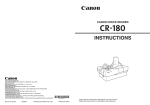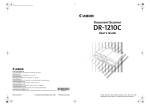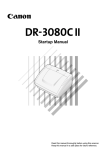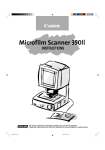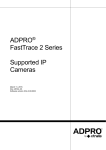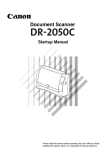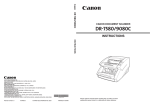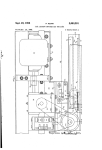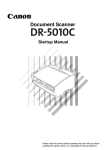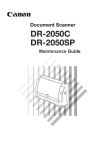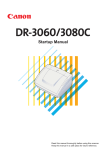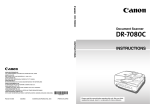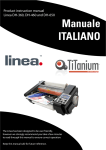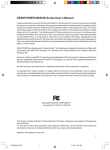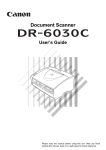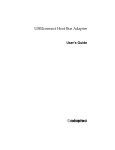Download Canon DR-2080C Owner's Manual
Transcript
Compact Document Scanner
STARTUP MANUAL
Read this manual thoroughly before using this scanner.
Keep this manual in a safe place for future reference.
International ENERGY STAR® Office Equipment Program
As an ENERGY STAR partner, Canon Electronics Inc. has determined that this product
meets the ENERGY STAR guidelines for energy efficiency.
The International ENERGY STAR Office Equipment Program is an international program
that promotes energy saving through the use of computers and other office equipment.
The program backs the development and dissemination of products with functions that
effectively reduce energy consumption. It is an open system in which business proprietors can participate voluntarily. The targeted products are office equipment such as
computers, monitors, printers, fax machines, copiers and Scanners. Their standards and
logos are uniform among the participating nations.
FCC REGULATIONS (For 120V models)
This equipment has been tested and found to comply with the limits for a Class B digital device, pursuant to
Part 15 of the FCC Rules. These limits are designed to provide reasonable protection against harmful
interference in a residential installation. This equipment generates, uses, and can radiate radio frequency
energy and, if not installed and used in accordance with the instructions, may cause harmful interference to
radio communications. However, there is no guarantee that interference will not occur in a particular
installation. If this equipment does cause harmful interference to radio or television reception, which can be
determined by turning the equipment off and on, the user is encouraged to try to correct the interference by
one or more of the following measures:
• Reorient or relocate the receiving antenna.
• Increase the separation between the equipment and receiver.
• Connect the equipment into an outlet on a circuit different from that to which the receiver is connected.
• Consult the dealer or an experienced radio/TV technician for help.
Do not make any changes or modifications to the equipment unless otherwise specified in the manual. If
such changes or modifications should be made, you could be required to stop operation of the equipment.
RADIO INTERFERENCE REGULATIONS (For 120V models)
This digital apparatus does not exceed the Class B limits for radio noise emissions from digital apparatus as
set out in the Interference-causing equipment standard entitled "Digital Apparatus", ICES-003 of the Industry Canada.
RÈGLEMENT SUR LE BROUILLAGE RADIOÉLECTRIQUE (For 120V models)
Cet appareil numérique respecte les limites de bruits radioélectriques applicables aux appareils numériques
de Classe B prescrites dans la norme sur le matériel brouilleur: "Appareils Numériques", NMB-003 édictée
par l'Industrie Canada.
Für EMVG
Dieses Produkt ist zum Gebrauch im Wohnbereich, Geschäfts-und Gewerbebereich sowie in Kleinbetrieben
vorgesehen.
MODEL NAMES
Model DR-2080C is identical to model M11044.
Model DR-2080C is the sales name of model M11044.
READ CAREFULLY BEFORE OPENING THE SEALED DISK PACKAGE
CANON SOFTWARE LICENSE AGREEMENT
IMPORTANT-READ THIS AGREEMENT BEFORE OPENING THE SEALED DISK PACKAGE! BY OPENING
THE SEALED DISK PACKAGE, YOU ARE DEEMED TO AGREE TO BE BOUND BY THIS AGREEMENT.
This legal document is a license agreement between you and Canon Electronics Inc. ("Canon"). BY OPENING THE SEALED DISK
PACKAGE, YOU ARE DEEMED TO AGREE TO BE BOUND BY THE TERMS OF THIS AGREEMENT. IF YOU DO NOT AGREE TO THE
TERMS OF THIS AGREEMENT, DO NOT OPEN THE SEALED DISK PACKAGE AND PROMPTLY RETURN THE CANON SCANNER,
THE DISK PACKAGE CONTAINING SCANNER DRIVER SOFTWARE PROGRAMS AND/OR SCANNER UTILITY SOFTWARE
PROGRAM PROPRIETARY TO CANON OR ITS LICENSOR (THE "SOFTWARE") AND THE ACCOMPANYING DOCUMENTATION
AND OTHER ITEMS TO THE PLACE WHERE YOU OBTAINED THEM FOR A REFUND BEFORE THEY ARE USED OR OPENED OR
UNPACKED.
In consideration of the right to use the SOFTWARE, you agree to abide by the terms and conditions of this Agreement.
1. GRANT OF LICENSE: Canon grants you the personal, non-exclusive right to use the SOFTWARE only on a single computer. You
may physically transfer the SOFTWARE from one computer to another provided that the SOFTWARE is used on only one computer at any time.
You shall not assign, sublicense, sell, rent, lease, loan, convey or transfer to any third party, or send or bring the SOFTWARE out of the
country where you originally obtain it to other countries without required authorization of applicable governments, or copy, duplicate, translate or
convert to another programming language the SOFTWARE or accompanying documentation, except as expressly provided herein.
Except as expressly permitted under the applicable law, you shall not alter, modify, disassemble, decompile or otherwise reverse engineer
the SOFTWARE or accompanying documentation and you also shall not have any third party to do so.
2. BACK-UP COPY: You may make one copy of the SOFTWARE solely for a back-up purpose or copy the SOFTWARE onto the
permanent storage device (e.g. a hard disk) of your computer and retain the original for a back-up purpose. Except as expressly permitted under the
applicable law, any other copying of the SOFTWARE is a violation of this Agreement. You must reproduce and include the copyright notice on the
back-up copy.
3. SUPPORT AND UPDATE: Canon, Canon's affiliate, their distributor or dealer is not responsible for maintaining or helping you to
use the SOFTWARE. No updates, fixes or support will be made available for the SOFTWARE.
4. LIMITED WARRANTY AND DISCLAIMER OF INDEMNITY: Canon, Canon's affiliate, their distributor or dealer will not
guarantee uninterrupted service, or absence or correction of errors. Therefore, the SOFTWARE is licensed on an "AS IS" basis without warranty of
any kind. The diskette on which the SOFTWARE is recorded is warranted against defective material or workmanship under normal use for a period
of ninety (90) days from the date you purchased the same as evidenced by a receipt or otherwise. The limited warranty does not apply if the failure
of the diskette resulted from accident, abuse or misapplication of the SOFTWARE and shall not extend to anyone other than the original user of the
SOFTWARE.
CANON, CANON'S AFFILIATE, THEIR DISTRIBUTOR OR DEALER DISCLAIMS ALL IMPLIED WARRANTIES, INCLUDING
ANY WARRANTY OF MERCHANTABILITY OR FITNESS FOR A PARTICULAR PURPOSE, WITH RESPECT TO THE SOFTWARE OR
ACCOMPANYING DOCUMENTATION.
NEITHER CANON, CANON'S AFFILIATE, THEIR DISTRIBUTOR NOR DEALER IS LIABLE FOR ANY LOSS OR DAMAGE
INCLUDING CONSEQUENTIAL OR INCIDENTAL LOSS OR DAMAGE SUCH AS LOSS OF PROFITS, EXPENSE OR INCONVENIENCE,
WHATSOEVER CAUSED BY OR ARISING OUT OF THE SOFTWARE, ACCOMPANYING DOCUMENTATION OR THE USE THEREOF.
CANON, CANON'S AFFILIATE, THEIR DISTRIBUTOR OR DEALER SHALL HAVE NO OBLIGATION TO INDEMNIFY YOU
AGAINST ANY CLAIM OR SUIT BROUGHT BY A THIRD PARTY ALLEGING THAT THE SOFTWARE, ACCOMPANYING
DOCUMENTATION OR THE USE THEREOF INFRINGES ANY INTELLECTUAL PROPERTY OF SUCH THIRD PARTY.
THE ABOVE IS CANON'S ENTIRE LIABILITY AND YOUR EXCLUSIVE REMEDY IN CONNECTION WITH THE SOFTWARE
AND ACCOMPANYING DOCUMENTATION.
5. TERM: This Agreement is effective upon opening the sealed disk package and remains in effect until terminated. You may terminate
this Agreement by destroying the SOFTWARE and any copy thereof. This Agreement will also terminate if you fail to comply with any of the
terms of this Agreement. In addition to Canon enforcing its respective legal rights, you must then promptly destroy the SOFTWARE and any copy
thereof.
6. U.S. GOVERNMENT RESTRICTED RIGHTS NOTICE: The SOFTWARE is provided with RESTRICTED RIGHTS. Use,
duplication or disclosure is subject to restrictions as set forth in either subparagraph (c) (1) (ii) of the Rights in Technical Data and Computer
Software clause at DFARs 252.227-7013 or subparagraph (c) (1) and (2) of the Commercial Computer Software Restricted Rights Clause at FAR
52.227-19, as applicable.
7. SEVERABILITY: In the event that provision of this Agreement is declared or found to be illegal by any court or tribunal of
competent jurisdiction, such provision shall be null and void with respect to the jurisdiction of that court or tribunal and all the remaining provisions
of this Agreement shall remain in full force and effect.
8. ACKNOWLEDGEMENT: BY OPENING THE SEALED DISK PACKAGE, YOU ACKNOWLEDGE THAT YOU HAVE READ
THIS AGREEMENT, UNDERSTOOD IT, AND AGREE TO BE BOUND BY ITS TERMS AND CONDITIONS. YOU ALSO AGREE THAT
THIS AGREEMENT IS THE COMPLETE AND EXCLUSIVE STATEMENT OF AGREEMENT BETWEEN YOU AND CANON
CONCERNING THE SUBJECT MATTER HEREOF AND SUPERSEDES ALL PROPOSALS OR PRIOR AGREEMENTS, VERBAL OR
WRITTEN, AND ANY OTHER COMMUNICATIONS BETWEEN YOU AND CANON RELATING TO THE SUBJECT MATTER HEREOF.
NO AMENDMENT TO THIS AGREEMENT SHALL BE EFFECTIVE UNLESS SIGNED BY A DULY AUTHORIZED REPRESENTATIVE
OF CANON.
Should you have any questions concerning this Agreement, or if you desire to contact Canon for any reason, please write to Canon's local affiliate.
Preface
Thank you for purchasing the Canon DR-2080C scanner. Be sure to read this
manual thoroughly before using the scanner in order to ensure that you fully
understand how to use the scanner correctly. After you have read this manual,
retain it for future reference.
CAUTION
Be aware of the following points when using this scanner for reproduction:
• Making duplicates of paper currency, coins, government-issued securities and other negotiable instruments is prohibited by law and subject to criminal penalties.
• Making duplicates of government-issued passports as well as licenses, permits, official
documents and private documents issued by public or private institutions may also be subject
to criminal penalties.
• Making duplicates of written works, music, paintings, prints, maps, drawings, movie stills,
photographs and other copyrighted works is prohibited, except when done for personal and
noncommercial purposes.
Copyright
Copyright © 2004 by CANON ELECTRONICS INC. All rights reserved. No part of
this publication may be reproduced, transmitted, transcribed, stored in a retrieval
system, or translated into any language or computer language in any form or by any
means, electronic, mechanical, magnetic, optical, chemical, manual, or otherwise,
without the prior written permission of CANON ELECTRONICS INC.
Trademarks
• Microsoft, Windows and Windows NT are registered trademarks of Microsoft Corporation in
the United States and/or other countries.
• ISIS is a trademark of Pixel Translations, A division of Captiva Software Corporation, in the
United Status.
• Intel and Pentium are registered trademarks of Intel Corporation.
• ENERGY STAR is a U.S. registered mark.
• Adobe is the registered trademark of Adobe Systems Incorporated in the United States and/or
other countries.
• Product names mentioned herein are for identification purposes only and may be trademarks
and/or registered trademarks of their respective countries.
Other Notice
The information given in these Operating Instructions is subject to change without
notice.
2
Preface
Notational Conventions
The symbols and indications used in this manual are explained below.
Familiarize yourself with these symbols and their meanings before reading
this manual.
“(→ page 12)”
Means “Refer to page 12 for more details.”
WARNING
This indicates a matter in which failure to follow proper procedure
could result in loss of life or serious injury. In order to ensure
safe operation, always observe these warnings.
CAUTION
This indicates a matter in which failure to follow proper procedure
could result in serious injury or property damage. In order to
ensure safe operation, always observe these cautions.
Notice
This indicates important information regarding the operation of the unit that
must be observed. Always read these items in order to prevent damage to the
unit or physical injury.
Note
This indicates supplemental information concerning the operation of the unit.
Reading these notes is recommended.
Preface
3
Table of Contents
Before Using the Unit ......................................................................................... 5
To Ensure Safe Operation ...................................................................................... 5
Installation Location .................................................................................................
About the AC adapter ...............................................................................................
Moving the Scanner .................................................................................................
Notes on Normal Handling .......................................................................................
Notes Concerning Disposal .....................................................................................
5
6
6
7
8
Features of the DR-2080C ..................................................................................... 9
Checking the Packing List .................................................................................... 11
Removing Protective Tape and Protective Sheet ................................................... 12
Names and Functions of Parts ............................................................................. 14
Installing the Scanner ....................................................................................... 16
Before Setting Up the Scanner ............................................................................. 16
Extending the stand ............................................................................................... 16
Installing the Feed Roller ....................................................................................... 16
Installation Requirements ..................................................................................... 20
Installation Procedure ........................................................................................... 22
Interface Board ..................................................................................................... 23
SCSI Boards .......................................................................................................... 23
USB 2.0 Interface Board ........................................................................................ 24
Connecting the Scanner to Your PC ..................................................................... 25
Connecting via SCSI .............................................................................................. 25
Connecting via USB ............................................................................................... 27
Connecting the Power Cord ................................................................................. 28
Turning the Power On/Off ..................................................................................... 29
Turning the Power On ............................................................................................ 29
Recognizing the Scanner ....................................................................................... 30
Turning the Power Off ............................................................................................ 32
Installing the Software ...................................................................................... 33
Installing the ISIS/TWAIN Driver ..........................................................................
Uninstalling the ISIS/TWAIN Driver ......................................................................
Installing CapturePerfect ......................................................................................
Uninstalling CapturePerfect ..................................................................................
33
35
38
39
Using the Software ............................................................................................ 41
Using the ISIS/TWAIN Driver ............................................................................... 41
Using CapturePerfect ........................................................................................... 42
Starting CapturePerfect .......................................................................................... 42
Closing CapturePerfect .......................................................................................... 43
Starting Up CapturePerfect by the Event Driven Function ................................... 44
Verifying the “Scanner Event” ................................................................................ 44
Using the Scanner............................................................................................. 47
Documents ........................................................................................................... 47
Loading a Document for Scanning ....................................................................... 48
Preparing for Scanning .......................................................................................... 48
Scanning Long Documents .................................................................................... 49
Loading a Document for Scanning ......................................................................... 50
Clearing Paper Jams ............................................................................................ 53
Regular Maintenance ........................................................................................ 55
Cleaning the Scanner ........................................................................................... 55
Cleaning the Scanning Glass and Transport Rollers ............................................ 56
Removing the Retard Roller ...................................................................................
Reinstalling the Retard Roller ................................................................................
Removing the Feed Roller .....................................................................................
Reinstalling the Feed Roller ...................................................................................
57
58
59
60
Cleaning the Metal Rollers ................................................................................... 60
Feed Rollers Replacements ................................................................................. 61
Resetting the Counter ............................................................................................ 62
Troubleshooting ................................................................................................ 64
Specifications .................................................................................................... 71
Index ............................................................................................................. 73
4
Table of Contents
Before Using the Unit
To Ensure Safe Operation
In order to ensure safe operation, be certain to read the cautions described
below.
Installation Location
At least 4 in. (100 mm)
At least 4 in.
(100 mm)
At least 4 in.
(100 mm)
Longer than the document size
(Document stop)
The performance of this unit is affected by the environment in which it is
installed. Make sure that the location where the unit is installed meets the
following environmental requirements.
● Do not setup the unit on a non-slip surface that may affect document
output.
● Provide adequate space around the unit (as indicated in the above diagram)
for operation, maintenance and ventilation purposes.
● Avoid locations exposed to direct sunlight. If the unit must be placed in
such a spot, hang a heavy curtain, etc., to shade the unit.
● Avoid dusty locations. Dust can get inside of the unit and cause problems.
● Avoid warm or humid locations, such as in the vicinity of a water faucet,
water heater, humidifier, etc., and avoid locations where there fumes from
ammonia, paint thinner, etc., may be present.
Before Using the Unit
5
● Avoid unstable surfaces and locations subject to vibration.
● Avoid locations that are subject to rapid temperature changes.
Condensation inside of the unit can result in inferior image quality. Use
this unit under the following environmental conditions:
Temperature: 10 degree C to 32.5 degree C
Humidity:
20% to 80% RH
● Avoid locating the unit near equipment that generates electromagnetic
fields, including speakers, televisions, and radios.
About the AC adapter
● Connect only to a power outlet of the rated voltage and power supply
frequency. (Either 120 V, 60 Hz or 220-240 V, 50/60 Hz depending on
your region.)
● Do not connect to power outlets with other electrical devices. Also, when
connecting via an extension cord, check the amperage rating.
● Disassembling and/or reassembling the AC adapter is extremely dangerous
and should not be attempted under any circumstances.
● Do not place heavy objects on the AC adapter or power cord. Do not place
the adapter or cords in an area where they are likely to be stepped on.
● Do not use the power cord while it is still bundled.
● Never pull directly on the power cord. To remove the plug from the outlet,
grasp the plug directly and remove.
● Keep the area around the power plug clear of articles so that the power plug
can be disconnected in an emergency.
● Use only the AC adapter provided with the product. Also, do not use the
scanner’s AC adapter with any other product.
120 V Model: MH3-2053 or MG1-3607
220-240 V Model: MH3-2054 or MG1-3607
● If unclear about the AC adapter, see your product dealer or the service
department for further information.
Moving the Scanner
● To avoid dropping or damaging the scanner, always carry it with two
hands. The scanner weighs approximately 2.3 kilograms.
● Make sure to disconnect the interface cable and AC adapter. If the scanner
is transported with these items plugged in, the plugs and connectors may be
damaged due to physical shock or concussion.
6
Before Using the Unit
Notes on Normal Handling
WARNING
To avoid fire and electric shock, always observe the following
warnings when using this unit.
■ Do not place flammable chemicals, such as alcohol or paint thinner, near
the unit.
■ Do not cut, damage, or modify the power cord. Do not place heavy objects
on the power cord, do not pull on the power cord, and do not bend the
power cord sharply.
■ Do not plug in or unplug the power cord with wet hands.
■ Do not use multi-outlet adapters to connect multiple devices to one outlet.
■ Do not tie up or bundle the power cord. Push the plug in as far as it will go
when plugging in the power cord.
■ Only use the AC adapter and the power cord that was provided with this
unit.
■ Do not attempt to disassemble or modify this unit.
■ Disassembling or reassembling of the AC adapter is extremely dangerous
and should not be attempted under any circumstances.
■ Do not use flammable sprays near this unit.
■ Always turn the unit off and unplug the power cord before cleaning this
unit.
■ To clean this unit, dampen a cloth in a mild detergent solution and then
wring the cloth out thoroughly. Do not use flammable liquids to clean the
unit, including alcohol, benzene, or paint thinner.
■ If the unit ever makes a strange noise, emits smoke or a strange odor, or
becomes hot, or if the unit does not operate at all even though the power is
on, immediately turn the unit off and unplug the power cord. Contact your
dealer or service representative to have the unit serviced.
■ Do not drop, kick, or otherwise strike the unit. If the unit does somehow
become damaged, immediately turn the unit off and unplug the power cord.
Contact your dealer or service representative to have the unit serviced.
■ Always turn the unit off and unplug the power cord before moving this
unit.
Before Using the Unit
7
CAUTION
■ Do not set the unit up on a wobbly platform, a sloped surface, or any other
type of unstable location. Do not set up the unit in a location that is subject
to vibration. The unit could injure someone if it falls or tips over.
■ Do not block the ventilation openings. Doing so could cause the unit to
overheat, creating a risk of fire.
■ Do not place paper clips, staples, necklaces or any other metallic objects on
top of the unit. Liquids or small metallic objects that get inside of the unit
create a risk of fire or electric shock. If such foreign matter does get inside
of the unit, unplug the power cord immediately, and then contact your
dealer or service representative for assistance.
■ Do not set up the unit in a dusty or humid location. Doing so creates a risk
of fire or electric shock.
■ Do not place objects on top of the unit. The object could injure someone if
it falls or tips over.
■ To prevent any risk of fire or electric shock, be sure that the power source
meets the power requirements of the unit.
■ When unplugging the power cord, always grasp the plug. Pulling on the
cord itself could expose or break the wires in the power cord, damaging the
cord and creating a risk of fire or electric shock.
■ In order to allow you to easily unplug the power cord at any time, do not
place other objects around the power outlet. Such obstacles could prevent
you from unplugging the power cord quickly in an emergency.
■ Do not spill liquids or flammable chemicals (such as alcohol, paint thinner,
or benzene) on the unit. Doing so creates a risk of fire or electric shock.
■ If the unit will not be used for an extended period of time, unplug the
power cord for safety’s sake.
■ When operating this unit, avoid wearing loose-fitting clothing, dangling
jewelry, or other material that could get pulled into the unit. Injury could
result. Be especially careful if you are wearing a necktie or have long hair.
In the event that some article or clothing does get caught in the unit, turn
the power off immediately.
■ Be careful when placing paper in the unit and when removing jammed
paper. It is possible to cut your hand on the edge of a sheet of paper.
Notes Concerning Disposal
CAUTION
Always follow the appropriate municipal by-laws or consult your service
center when disposing of the scanner or the AC adapter.
8
Before Using the Unit
Features of the DR-2080C
The main features of the DR-2080C scanner are listed below.
■ Compact size
The scanner is extremely compact, 11.7W x 8.2H x 3.9D in. (298W x 209H
x 99D mm). Further, because the DR-2080C is an upright scanner, it does
not take up a lot of space.
■ SCSI/USB2.0 Interface supported
The scanner is equipped with both SCSI and Hi-Speed USB 2.0 interface to
be connected to a personal computer.
■ Color/Grayscale support
Documents can be scanned in 24-bit color or 256-level grayscale.
■ Supports a variety of scanning modes*
The scanner supports the following scanning modes, depending on the
document type:
● Single-sided/double-sided mode
● Single-sheet/continuous feed
■ Automatic document size detection*
The scanner automatically detects the size of a scanned document and
eliminates any unnecessary space around the edges of the document when
storing it, even when storing a document of irregular size.
■ High durability
The scanner has high durability of 500,000 scans at maximum.
■ Folio scan
A folio (folded in half) document can be set for scanning as it is and the
scanned images of both sides are put together in a page.
■ Dropout color
The scanner is equipped with a “dropout color” function that allows you to
specify a color for the scanner to omit from scanned images. (This
correction is made by the ISIS/TWAIN driver.)
■ Deskew
The deskew function automatically straightens an image if the document
was loaded askew. (This correction is made by the ISIS/TWAIN driver.)
■ Text enhanced mode
The scanner is equipped with a “text enhanced” mode that allows you to
clearly scan text printed on a dark background, and text that is written in
faint pencil. (This function is implemented by the ISIS/TWAIN driver.)
* Available when using applications that support these functions.
Before Using the Unit
9
■ “Skip blank page” function
The scanner is equipped with a “skip blank page” function that allows it to
scan a document regardless of whether every page is double-sided or
single-sided. (This function is implemented by the ISIS/TWAIN driver.)
■ Pre-scan function
The scanner is equipped with a pre-scan function that allows you to adjust
the contrast and brightness of a pre-scanned image and then sends the
adjusted image to the application software, without needing to scan the
document again. (This function is implemented by the ISIS/TWAIN
driver.)
■ Auto Start
The scanner is equipped with an auto start function that automatically
initiates scanning when a document is placed in the document feed port.
(This function is implemented by the ISIS/TWAIN driver.)
■ Compatible with carbonless duplicating paper
The scanner is able to scan carbonless duplicating paper.
■ Power-saving feature
The scanner has a power-saving feature that puts the scanner in low-power
mode after it has been idle for a certain period of time.
10
Before Using the Unit
Checking the Packing List
The contents of the carton in which this unit is shipped are described below. If
anything is missing or damaged, contact your dealer or service representative.
Feed roller
w Document stop
e Setup disc (CD-ROM)
Startup manual (this manual)
t Adjustment sheet
y Quick Reference Guide u Software license agreement
i Warranty card (U.S.A. and Canada only) o USB cable
!0 Power cord
!1 AC adapter (120V Model : MH3-2053 or MG1-3607,
220-240V Model: MH3-2054 or MG1-3607)
!2 Paper side guide adapter !3 Scanner
q
r
• Adjustment (shading adjustment) sheets are inserted at the last page of this
manual. Be sure to keep them with care to prevent loss.
• The packed contents of the carton are subject to change without notice.
• Keep the carton and the packing material for future use if it is ever
necessary to store or transport the unit.
Before Using the Unit
11
Removing Protective Tape and Protective Sheet
Before using the scanner, remove the protective tape and protective sheet that
protect the unit from damage during shipment.
1. Remove the protective tape that is attached to the exterior of the unit.
2. Remove the protective sheet from between the paper feed tray and the
scanner.
3. Lift the edge of the paper feed tray to open it.
12
Before Using the Unit
4. While squeezing the OPEN release (➀), open the front unit towards you (➁).
5. Remove the protective tape pasted on the inside of the scanner.
Before Using the Unit
13
Names and Functions of Parts
This section explains the name and function of each part. Familiarize yourself
with the parts before connecting the scanner.
■ Front and right views
Top cover
Open this cover to set your
document.
Stop key
Press this key to stop the document
scanning.
Power indicator
This lights when you
turn on the scanner.
Start key
Press this key to start the document
scanning.
Feed selection lever
Sets the feeding method of
documents. To feed the sheets of
a multi-page document
individually, set the lever in the
down position (page separation
mode). To feed all the sheets of a
non-separable multi-page
document, set the lever in the up
position to bypass separation.
(bypass mode).
Paper feed tray
Open this cover if
the document is
protruding from the
document feed
opening.
Document eject
opening
Scanned documents
are ejected from
here.
Feed indicator
This shows the position of
the feed selection lever.
■ Front view (with top cover and paper feed cover open)
Paper feed extension plate
Pull this out if the document
falls forward.
Document positioning mark
Align the paper side guides with this
mark according to the size of the
document to be scanned.
Paper side guide adapters
Set these adapters into the paper
side guides if paper skews during
feeding.
Document feed opening
Set the document that you want to
scan here.
Front unit
Document stop
To prevent ejected documents
from scattering, set this in a
position apart from the
document eject opening by at
least the length of the
document.
14
Before Using the Unit
Paper side guides
Adjust these to the width of the
document.
OPEN release
Use this to open the front unit.
■ Rear and left views
DIP switches
These set the SCSI ID.
SCSI connector
Connects to a 50-pin
half-pitch (pin type)
SCSI cable.
Ventilation
openings
USB connector
Connects to a HiSpeed USB 2.0compatible cable.
Stand
Pull this out to
prevent the unit from
toppling.
Power connector
Connects to the AC
adapter provided with
this unit.
Power switch
Turns the scanner’s
power on and off.
CAUTION
Do not block the ventilation openings. Doing so could cause the
unit to overheat, creating a risk of fire.
■ Symbols Used in This Guide
This symbol shows the setting
method (central position, front/back,
and paper feed direction) for the
document to be scanned.
These symbols show the method
for arranging documents with
multiple pages.
Shows that the pages of the
document set in the scanner are all
fed at once without separation
(bypass mode).
This symbol shows that the pages
of the document set in the scanner
are fed sheet by sheet (page
separation mode).
Before Using the Unit
15
Installing the Scanner
Before Setting Up the Scanner
Extending the stand
Extend the stand located at the rear of the unit to prevent it from toppling.
Notice
Make sure that you use the unit with the stand extended. If you do not use the
stand, the unit may topple and be damaged.
Installing the Feed Roller
Open the front unit and install the provided feed roller.
1. Lift the edge of the paper feed tray to open it.
16
Installing the Scanner
2. While squeezing the OPEN release (➀), open the front unit towards you (➁).
3. Open the roller cover inside the scanner. To open the cover, set your finger in
the groove and lift.
4. Raise the roller lock lever (➀), and slide it in the direction of the arrow (➁).
5. Insert the feed roller into the groove inside the roller cover, and align the
notch in the roller with the spindle in the front unit.
Installing the Scanner
17
6. Slide the roller lock lever to the right, and set it into the hollow to the left of
the roller.
7. Lower the lever to fasten the feed roller spindle.
8. Close the roller cover. Make sure that the cover clicks into place and is
returned to its original position.
18
Installing the Scanner
9. Gently press the upper left and right edges of the front unit. Make sure that the
cover clicks into place and is returned to its original position.
10. Close the paper feed tray.
11. Close the top cover.
Installing the Scanner
19
Installation Requirements
In order to use the DR-2080C, your computer must satisfy the following
system requirements:
● IBM PC/AT-compatible that satisfies the following specifications:
• Intel Celeron 733MHz or faster
• Main memory: 256 MB or more (recommended)
• Hard disc space: 400 MB or more
● SCSI board or USB 2.0 interface board that supports the scanner (→ page
23 “Interface Board”)
● Display that is capable of resolution of 1024 x 768 (XGA) or better
(recommended)
● One of the following operating systems, running normally:
Connecting via SCSI
• Microsoft Windows 95
• Microsoft Windows 98/98SE
• Microsoft Windows Me
• Microsoft Windows NT 4.0 Workstation
• Microsoft Windows 2000 Professional SP4
• Microsoft Windows XP
Connecting via USB2.0
• Microsoft Windows 98SE
• Microsoft Windows Me
• Microsoft Windows 2000 Professional SP4
• Microsoft Windows XP
● ISIS-compatible or TWAIN-compatible application software that runs
normally under your operating system
Notice
● If you are connecting the scanner via USB 2.0 interface, be sure to use an
updated version of the USB 2.0 driver. For details on the updated driver,
contact your dealer.
● If your CPU, memory or SCSI board does not meet the recommended
specifications, you may experience problems such as slow scanning speed.
Note
● Be sure to allocate sufficient virtual memory.
● Use the SCSI board provided a SCSI board recommended for use with the
unit.
● After checking the shape of the connectors on the computer connected to
the unit and SCSI device, use the SCSI cable provided purchase a SCSI
cable with the right combination of connectors. (→ page 23)
20
Installing the Scanner
● The USB cable you are using should be the one originally bundled with the
scanner or a Hi-Speed USB 2.0-compatible cable.
● Depending on the application software that you are using, the device driver
provided may not operate, or you may not be able to use the functions
described in this guide.
● Make sure that the device driver and application software that you will be
using are compatible with your PC, the system configuration, and the type
of SCSI board that you are using.
● The ISIS/TWAIN driver provided with the scanner is not necessarily
compatible with all ISIS-compatible or TWAIN-compatible application
software. For details, contact your application software dealer.
Installing the Scanner
21
Installation Procedure
The procedure for installing the unit is outlined below. (For a detailed outline
of this procedure, see “Connecting the Scanner to Your PC” at the end of this
section.)
1. Check the interface board in your computer.
(→ page 23 “Interface Board”)
↓
2. Connect the scanner to the PC.
(→ page 25 “Connecting the Scanner to your PC”)
↓
3. Connect the power cord to the scanner.
(→ page 28 “Connecting the Power Cord”)
↓
4. Turn the scanner on first, and then start up the PC.
(→ page 29 “Turning the Power On/Off”)
↓
5. Let the PC recognize the Scanner
(→ page 30 “Recognizing the Scanner”)
↓
6. Turn the scanner off. (→ page 32 “Turning the Power Off”)
22
Installing the Scanner
Interface Board
When connecting the scanner via USB, verify that the USB 2.0 interface
board you are using is one recommended for use with the scanner. The
recommended USB 2.0 interface boards are as follows:
SCSI Boards
When connecting the scanner via SCSI, verify that the SCSI board you are
using is one recommended for use with the scanner. The recommended SCSI
boards are as follows:
Recommended SCSI boards
Manufacturer : Adaptec
Models
: AHA-2930U, AHA-2940AU, ASC-2915LP, ASC2930LP, ASC-19160, ASC-29160, APA-1480
Notice
When installing the SCSI board in your computer, please refer to the
computer user’s guide and follow the instructions provided
Note
● The APA-1480U is not supported by Windows NT 4.0 Workstation.
● Windows 2000 and Windows XP do not support synchronous transfer with
the ASC-2915/2930LP; therefore scanner throughput is slightly reduced.
(As of January, 2003.)
Installing the Scanner
23
USB 2.0 Interface Board
When connecting the scanner via USB, verify that the USB 2.0 interface
board you are using is one recommended for use with the scanner. The
recommended USB 2.0 interface boards are as follows:
Recommended USB2.0 Interface boards
Manufacturer : Adaptec
Models
: USB2connect2000LP (AUA-2000)
USB2connect3100 (AUA-3100LP)
USB2connect5100 (AUA-5100)
USB2connect for Notebooks (AUA-1420)
Notice
● When installing the USB 2.0 interface board in your computer, please refer
to the computer user’s guide and follow the instructions provided.
● Make sure that the USB driver is an updated version provided by Adaptec
or Microsoft.
Note
● The DR-2080C passed the Hi- Speed USB 2.0 certification test. However,
when you use the scanner with a personal computer equipped with USB 2.0
as standard, the scanner may not always operate normally.
● If the inerface is not Hi-Speed USB 2.0-compatible, the scanning speed
will slow.
24
Installing the Scanner
Connecting the Scanner to Your PC
There are two ways of connecting the scanner to your computer, via SCSI or
via USB. Choose either way suitable for the environment in which you are
using the PC.
Notice
● When the application is running, do not turn the scanner off nor unplug the
interface cable.
● Do not connect both a SCSI cable and a USB cable concurrently.
● Do not connect multiple DR-2080Cs to one (1) computer.
● When having changed the connection, be sure to turn the scanner and the
PC on once again.
Connecting via SCSI
Notes on the Shape of Connectors and the SCSI Cable
• The DR-2080C is equipped with a 50-pin half-pitch (pin type) SCSI
connector.
• After checking the shape of the SCSI connector on your computer and
connected SCSI device, use the SCSI cable provided purchase a SCSI
cable with the right combination of connectors.
DR-2080C
SCSI device
50-pin half-pitch
(pin type)
Computer
SCSI cable
Installing the Scanner
25
Notice
● Make sure that the scanner and your PC are both turned off when
connecting the scanner to the PC.
● Since the provided SCSI board uses a D-sub 25-pin connector, take care to
connect the SCSI cable to the SCSI board connector, and not to the D-sub
25-pin connector of the printer port.
● The terminator of the scanner is set to ON as default. Be sure to turn off all
terminators of the SCSI devices connected between the scanner and the PC.
Note
The SCSI ID is set to “2” at the factory before shipping.
You can set the SCSI ID by using the DIP-switch provided on the left side of
the scanner. In the DIP-switch settings, the SCSI ID can be set to ON by
turning the switch to the rear side, or OFF by turning it to the front side.
SCSI ID switches
ON 1
2
Default settings
(SCSI ID = 2)
Refer to the following table when setting the SCSI ID. If there are other SCSI
devices connected to or inside the PC, make sure to set a unique ID for the
scanner.
26
SCSI ID
SW1
SW2
2
OFF
OFF
3
ON
OFF
4
OFF
ON
5
ON
ON
Installing the Scanner
Connecting via USB
USB interface connection
• Be sure to use the USB cable bundled with the scanner or a Hi-Speed
USB 2.0-compatible cable.
• When using a USB extension board that supports Hi- Speed USB 2.0, be
sure to choose one verified for use with the scanner.(→ page 24 )
DR-2080C
SCSI device
Computer
Flat-shaped connector
Smaller squareshaped connector
Notice
● If the OS you are using is Windows 95/NT, the connection via USB is not
supported. When using the DR-2080C with Windows 95/NT, be sure to
connect the scanner via SCSI.
● When using a USB hub, be sure to use one compatible with USB 2.0.
Note
● The DR-2080C passed the Hi- Speed USB 2.0 certification test. However,
when you use the scanner with a personal computer equipped with USB 2.0
as standard, the scanner may not always operate normally.
● If the inerface is not Hi-Speed USB 2.0-compatible, the scanning speed
will slow.
Installing the Scanner
27
Connecting the Power Cord
1. Connect the power cord provided with the unit to the AC adapter.
Notice
● Only use the power cord and AC adapter provided with this unit.
● Always be sure to turn the power switch off before plugging in the power
cord.
2. Connect the AC adapter connector to the connector located on the left side of
the scanner, and then plug the power cord into a power outlet.
28
Installing the Scanner
Turning the Power On/Off
Follow the procedures described below when turning the power on and off.
Turning the Power On
1. Turn on the scanner.
The power switch is located on the lower right rear corner of the scanner.
To turn the scanner on, slide the power switch towards the “ |” mark. When
the power indicator lights green, the scanner is on.
2. Turn on the PC.
WARNING
If the unit ever makes a strange noise, emits smoke or a strange
odor, or becomes hot, or if the unit does not operate at all even
though the power is on, immediately turn the unit off and unplug
the power cord. Contact your dealer or service representative to
have the unit serviced.
Recognizing the Scanner
If you are using Windows 95/98/Me/2000 or Windows XP, then the first time
that you turn on your PC after connecting this scanner to your PC, Windows
Plug and Play automatically displays a screen prompting you to install the
scanner driver. Follow the instructions on the screen to proceed with the
installation.
● If you are using Windows 95, the “Found New Hardware” dialog box
appears.
1. Select “Driver from disk provided by hardware manufacturer” and then
click the OK button.
2. Load the setup disc into your CD-ROM drive.
Installing the Scanner
29
3. In the “Copy manufacturer’s files from” box, type “D:\INF\Win95” (where
“D” is the name of your CD-ROM drive), and then click the OK button.
● If you are using Windows 95 (OSR2), the “Update Device Driver Wizard”
dialog box appears.
1. Click the Next button.
2. Click Other locations.
3. Load the setup disc into the computer’s CD-ROM drive.
4. Type “D:\INF\Win95” (where “D” is the drive letter assigned to your CDROM drive) and then click the OK button.
5. Click the Finish button.
● If you are using Windows 98, the “Add New Hardware Wizard” dialog box
appears.
1. Click the Next button.
2. Select “Search for the best driver for your device. (Recommended).” and
then click the Next button.
3. Load the setup disc into the computer’s CD-ROM drive.
4. Select “Specify a location”, type “D:\INF” (where “D” is the drive letter
assigned to your CD-ROM drive) and then click the Next button.
5. Click the Next button.
6. Click the Finish button.
● If you are using Windows Me, the “Add New Hardware Wizard” dialog
box appears.
1. Select “Specify the location of the driver (Advanced)” and then click the
Next button.
2. Load the setup disc into the computer’s CD-ROM drive.
3. Select “Search for the best driver for your device. (Recommended).” and
then select “Specify a location”. Next, type “D:\INF” (where “D” is the
drive letter assigned to your CD-ROM drive) and then click the Next
button.
4. Click the Next button.
5. Click the Finish button.
● If you are using Windows 2000 Professional, the “Found New Hardware
Wizard” dialog box appears.
1. Click the Next button to proceed to the “Install Hardware Device Drivers”
screen.
2. Select “Search for a suitable driver for my device (recommended)” and
then click the Next button to proceed to the “Locate Driver Files” screen.
3. Select “Specify a location” and then click the Next button.
30
Installing the Scanner
4. Load the setup disc into the computer’s CD-ROM drive.
5. Type “D:\INF” (where “D” is the drive letter assigned to your CD-ROM
drive) and then click the OK button.
6. In the “Driver Files Search Results” screen, click the Next button.
7. If the message “Digital Signature Not Found” appears, simply click Yes to
continue installation.
8. On the “Completing the Found New Hardware Wizard” screen, click the
Finish button.
● If you are using Windows XP, the “Found New Hardware Wizard” dialog
box appears.
1. Load the setup disc into the computer’s CD-ROM drive.
2. In the “Welcome to the Found New Hardware Wizard” screen, select
“Install from a list or specific location (Advanced)”, and then click the
Next button.
3. Select “Search for the best driver in these locations”, and then clear the
“Search removable media (floppy, CD-ROM...)” check box. Select
“Include this location in the search”, type “D:\INF” (where “D” is the drive
letter assigned to your CD-ROM drive), and then click the Next button.
4. Click the Continue Anyway button in the “Hardware Installation” dialog
box.
Although a message appears indicating that the driver “has not passed
Windows logo testing”, simply continue operation.
5. Click the Finish button in the “Completing the Found New Hardware
Wizard” screen.
Notice
● The DR-2080C is registered as “CANON DR-2080C SCSI” or “CANON
DR-2080C USB” in the “Imaging Device” directory.
● The displayed device name of the DR-2080C differs depending on the
connection, via SCSI or via USB. When having changed the connection, be
sure to let the PC recognize the scanner once again.
Installing the Scanner
31
Turning the Power Off
CAUTION
If the unit will not be used for an extended period of time, unplug
the power cord for safety’s sake.
1. Turn off the PC.
2. Turn off the scanner.
The power switch is located on the lower right rear corner of the scanner.
To turn the scanner off, slide the power switch towards the “ ” mark. When
the power indicator goes out, the scanner is off.
Notice
● When connecting the DR-2080C via SCSI, turn the scanner on first, and
then turn the PC on.
● Wait at least 10 seconds before turning the scanner back on.
32
Installing the Scanner
Installing the Software
Notice
Before installing the software, be sure to open and read the Readme.txt file on
the setup disc.
The setup disc included with the scanner contains the following software:
● ISIS/TWAIN driver
This driver allows this scanner to be used with ISIS-compatible application
software or TWAIN-compatible application software. The driver must be
installed in order to be able to use the scanner.
● CapturePerfect
This is a TWAIN-compatible software application. Install this application
if necessary.
● OmniPage SE
This is a TWAIN-compatible, OCR application supplied by ScanSoft.
Install this application if necessary.
Note
Please follow the instruction in the manual proveded in the “OmniPage”
folder in the setup disc.
Installing the ISIS/TWAIN Driver
Follow the procedure described below to install the ISIS/TWAIN driver.
Notice
If another ISIS-compatible driver is already installed in your PC, you must
back up the files listed below. These files may be overwrittdŒ`when you
install this ISIS/TWAIN driver.
C:\Windows\System\pix*.dll
C:\Windows\PixTran\*.*
Note
The name of the “\Windows” and “\Windows\System” folder varies,
depending on which version of Windows you are using. Substitute
accordingly in the above folder names with the folder names for Windows
used in your system.
Installing the Software
33
1. Turn on your PC. Windows starts.
Notice
If you are using Windows NT 4.0 Workstation, Windows 2000 Professional,
or Windows XP, be sure to log on as a user with administrator privileges.
2. Load the setup disc in the PC’s CD-ROM drive.
3. On the Start menu, Click Run.
The Run dialog box appears.
4. In the Open box, type “D:\Driver\Setup.exe” (where “D” is the drive letter
assigned to your CD-ROM drive) and then click the OK button.
The Installer starts.
5. Follow the instructions on the screen and complete the installation process.
34
Installing the Software
Uninstalling the ISIS/TWAIN Driver
Follow the procedure described below to uninstall the ISIS/TWAIN driver.
Notice
If you are using Windows NT 4.0 Workstation, Windows 2000 Professional,
or Windows XP, be sure to log on as a user with administrator privileges.
1. On the Start menu, point to Settings and click Control Panel.
Note
If you are using Windows XP, on the Start menu, click Control Panel.
The “Control Panel” window is displayed.
Installing the Software
35
2. Double-click the “Add/Remove Programs” icon.
Note
If you are using Windows XP, click the “Add or Remove Programs” icon.
The “Add/Remove Programs Properties” dialog box is displayed.
Note
If you are using Windows XP, the “Add or Remove Programs” dialog box is
displayed.
3. Select “Canon DR-2080C Scanner Driver” from the list, and then click the
Add/Remove button.
Note
If you are using Windows XP, click the Change/Remove button.
36
Installing the Software
The “Confirm File Deletion” dialog box is displayed.
4. Click the Yes button to start the uninstaller.
Follow the instructions on the screen and complete the uninstallation process.
Installing the Software
37
Installing CapturePerfect
Follow the procedure described below to install CapturePerfect.
1. Turn on your PC. Windows starts.
Notice
If you are using Windows NT 4.0 Workstation, Windows 2000 Professional,
or Windows XP, be sure to log on as a user with administrator privileges.
2. Load the setup disc in the PC’s CD-ROM drive.
3. On the Start menu, click Run.
The Run dialog box appears.
4. In the Open box, type “D:\CapturePerfect\Setup.exe” (where “D” is the drive
letter assigned to your CD-ROM drive) and then click the OK button.
The Installer starts.
5. Follow the instructions on the screen and complete the installation process.
38
Installing the Software
Uninstalling CapturePerfect
Follow the procedure described below to uninstall CapturePerfect.
Notice
If you are using Windows NT 4.0 Workstation, Windows 2000 Professional,
or Windows XP, be sure to log on as a user with administrator privileges.
1. On the Start menu, point to Settings and click Control Panel.
Note
If you are using Windows XP, on the Start menu, click Control Panel.
The “Control Panel” window is displayed.
2. Double-click the “Add/Remove Programs” icon.
Note
If you are using Windows XP, click the “Add or Remove Programs” icon.
Installing the Software
39
The “Add/Remove Programs Properties” dialog box is displayed.
Note
If you are using Windows XP, the “Add or Remove Programs” dialog box is
displayed.
3. Select “CapturePerfect” from the list, and then click the Add/Remove button.
Note
If you are using Windows XP, click the Change/Remove button.
The “Confirm File Deletion” dialog box is displayed.
4. Click the Yes button to start the uninstaller.
Follow the instructions on the screen and complete the uninstallation process.
40
Installing the Software
Using the Software
Using the ISIS/TWAIN Driver
The ISIS/TWAIN driver help describes how to use the ISIS/TWAIN driver.
To access the ISIS/TWAIN driver help, click Start - Programs (when using
Windows XP, click All Programs) - Canon Document Scanner - Canon DR2080C Help, or click the Help button displayed in the dialog box.
Using the Software
41
Using CapturePerfect
Follow the procedure described below to start and close CapturePerfect.
Note
The basic method for scanning using CapturePerfect is described in the
CapturePerfect help. From the Help menu on the CapturePerfect menu bar,
click Help, then refer to the explanation of how to use CapturePerfect.
Starting CapturePerfect
1. Turn on the scanner.
2. Turn on your computer. Windows starts.
3. On the Start menu, point to Programs (when using Windows XP, point to All
Programs) and then click CapturePerfect.
CapturePerfect starts.
42
Using the Software
Closing CapturePerfect
1. On the File menu, click Exit.
CapturePerfect closes.
Using the Software
43
Starting Up CapturePerfect by the Event Driven
Function
The DR-2080C and CapturePerfect together support the “Scanner Event”
driven function of Windows.
When the ISIS/TWAIN driver and CapturePerfect are installed in the PC,
pressing the Start button on the scanner starts up CapturePerfect
automatically.
Note
Windows 95/NT do not support this function.
Verifying the “Scanner Event”
1. Open the “Scanner and Camera” folder.
Note
● Windows 95/NT do not display the “Scanner and Camera” folder.
● The displayed dialog box differs depending on Windows you are using.
• Windows 98/2000 display the “Scanner and Camera Properties” dialog
box.
• Windows Me/XP display the “Scanner and Camera” folder.
44
Using the Software
2. Select [CANON DR-2080C SCSI] (or, [CANON DR-2080C USB]) to display
[Properties].
“Scanner and Camera” Properties (Window 98)
“Scanner and Camera” folder (Windows XP)
3. Click the [Event] tab.
Using the Software
45
4. Confirm whether CapturePerfect is selected (checked).
Note
● When started up by the event driven function, some applications may not
operate normally.
● If you are not using the event driven function, select the “Disable device
events” check box
● If you are using Windows 2000/XP, restart Windows to enable the Event
settings you have changed.
46
Using the Software
Using the Scanner
Documents
This scanner is able to scan documents ranging in size from business cards to
legal size documents. The scannable size range is:
Width:
Length:
2.2 in. to 8.5 in. (55 mm to 216 mm)
2.8 in. to 11.7 in. (70 mm to 297 mm) with page separation
mode
2.8 in. to 14 in. (70 mm to 355 mm) with bypass mode
Thickness: 0.0024 in. to 0.0059 in. (0.06 mm to 0.15 mm) with page separation
mode
0.0019 in. to 0.0079 in. (0.05 mm to 0.2 mm) with bypass mode
There are certain criteria that a document must meet in order to be scannable.
Familiarize yourself with the following points:
● When scanning a multi-page document, pages must be grouped together so
that they have the same size, thickness and weight. Scanning different
types of paper at one time can cause the scanner to jam.
● Scanning documents before the ink is dry can cause problems with the
scanner. Always make sure that the ink on a document is dry before
scanning it.
● Scanning documents that are written in pencil or similar material can make
the rollers dirty, which can then transfer the dirt to subsequent documents.
Always clean the rollers after scanning a document written in pencil.
● When scanning a double-sided document that is printed on thin paper, the image on
the opposite side of each page may show through. Before scanning, adjust the
brightness setting in your application software.
● Scanning the following types of documents can cause paper jams or
malfunctions. To scan such documents, make photocopies of the
documents and then scan the photocopies.
Wrinkled or
creased
documents
Documents
with paper
clips or
staples
Extremely
thin,
translucent
paper
Curled
documents
Carbon
paper
Paper with
square
holes
Torn
documents
Surfacetreated
paper
Using the Scanner
47
Loading a Document for Scanning
Make preparations based on the size of the document and the feeding method
that you want to use, and then load the document for scanning.
Preparing for Scanning
1. Open the top cover.
2. Check the position of the feed selection lever and set it according to the type
of document being loaded. To feed the sheets of the document individually,
set the feed selection lever in the down position (page separation mode). To
feed all the sheets of the set document at once, set the feed selection lever in
the up position (bypass mode).
bypass mode
page separation
mode
Note
● If you set the feed selection lever in the up position, you can scan
documents such as bound vouchers as they are. In this case, only the first
page is scanned.
● When scanning particularly thin or thick documents, set the feed selection
lever in the up position (page separation mode).
48
Using the Scanner
3. Align and set the document stop provided with the unit to the size of the
document to be scanned. By using the document stop, you can prevent
documents from becoming disorganized when they come out from the
document eject opening.
Place at a distance greater
than the length of the
document to be scanned.
Scanning Long Documents
When scanning documents that extend beyond the document feed opening,
open the paper feed tray to set the document.
1. Open the paper feed tray.
Note
If documents skew during scanning, you can reduce skew by attaching the
provided paper side guide adapters. When you attach the paper side guide
adapters, orient them as shown in the illustration. Make sure that the paper
side guides are inserted all the way into the fork of the paper side guide
adapters.
Using the Scanner
49
Loading a Document for Scanning
Notice
When loading a document for scanning, be careful to remove all paper clips,
staples, etc., from the document. During the scanning process, such objects
can tear the document, cause paper jams and/or damage the scanner.
1. Set the paper feed select lever and paper side guide adapters according to the
type of document to be scanned. (→ Page 48, 49)
2. Get ready to perform the scanning operation with the application software that
you are using.
3. Align the paper side guides with the width of the document that is to be
scanned. If the document is printed on A4 or letter-sized paper, align the
guides with the appropriate paper size mark.
4. When scanning a multiple-page document, fan the pages, then stagger them as
shown in the illustration so that so that the top edge of the first page is lowest.
(Set the document with the top end at the bottom.)
123
123
4
4
ABC
ABC
CAUTION
Be careful when handling documents. It is possible to cut your
hand on the edge of a sheet of paper.
50
Using the Scanner
5. Load the document in the document feed opening.
Note
● Orient the document with the back side facing forward and top edge
pointing down, and then load it into the document feed opening.
● If the document falls forward because the paper is too thin, pull out the
paper feed extension plate and push the document so that it falls backward.
● When scanning a document folded in half, set the document with the fold
on the right (➀) and turn the feed selection lever upward (➁).
● Even if scanning a multiple number of folio (folded in half) documents, be
sure to set a document at a time.
Using the Scanner
51
6. Adjust the paper side guides.
Note
Before starting a scan, make sure that the document is loaded in the scanner
correctly. Scanning a curled document or a creased document can damage the
document.
7. Perform the scanning operation in accordance with the normal operating
procedure for your application software.
Notice
● If the paper feed operation stops due to a system error or a paper jam while
the scanner is scanning, resolve the problem, make sure that the scanned
image of the last page that was fed has been stored, and then resume the
scanning operation.
● When you finish scanning, lower the paper feed extension plate, remove
the paper side guide adapters, and finally close the paper feed tray cover
and top cover to protect the scanner against possible damage.
Note
● When operating this unit, avoid wearing loose-fitting clothing, dangling
jewelry, or other objects that could be pulled into the unit. Injury could
result. Be especially careful if you are wearing a necktie or have long hair.
In the event that an object or clothing is caught in the unit, turn the power
off immediately.
● Depending on the type of document you are using, the unit may make a
strange noise when documents are fed. This is not a malfunction.
52
Using the Scanner
Clearing Paper Jams
If a paper jam occurs in the scanner, follow the procedure described below.
CAUTION
Be careful when removing jammed paper. It is possible to cut
your hand on the edge of a sheet of paper.
1. If the paper feed tray is closed, open it.
2. While squeezing the OPEN release (➀), open the front unit towards you (➁).
3. Remove the jammed paper from the feed or eject section.
Notice
Do not pull hard on the jammed sheet; remove it gently. If the sheet rips, be
sure to remove all the remaining pieces of paper.
Using the Scanner
53
4. Gently press the upper left and right edges of the front unit. Make sure that the
cover clicks into place and is returned to its original position.
5. If necessary, close the paper feed tray.
Note
Once you have cleared the paper jam, check whether the scanned image on
the last page has been stored properly or not, and then resume scanning.
54
Using the Scanner
Regular Maintenance
Clean the scanner on a regular basis as described below in order to maintain
peak scanning quality.
CAUTION
For safety’s sake, always turn the unit off and unplug the power
cord before cleaning the unit. However, because the power must
be on when cleaning the metal rollers, exercise extreme care
when performing this operation.
Cleaning the Scanner
To clean the exterior of the scanner, dampen a cloth with water or a mild
detergent, wring the cloth out thoroughly, and then wipe the dirt away. Then
use a dry cloth to wipe away any moisture.
CAUTION
Never use paint thinner, alcohol, or other organic solvents to
clean the scanner. Such solvents can damage or discolor the
exterior of the scanner. They also create a risk of fire and electric
shock.
Regular Maintenance
55
Cleaning the Scanning Glass and Transport Rollers
1. Turn the power off and unplug the power cord from the power outlet.
2. Open the paper feed tray.
3. While squeezing the OPEN release, open the front unit towards you.
4. Wipe the scanning glass (the shaded portion ■ in the illustration) with a clean,
dry cloth.
CAUTION
Both the front unit and body of the scanner have scanning
glasses. Be sure to clean both of them. Do not spray water or
cleaning solution directly onto the scanning glass. Doing so
could damage the scanner’s light source or precision optical
components.
5. Clean rollers ➀ to ➃. Clean the rollers by wiping them with a moist cloth,
then wipe the rollers with a clean, dry soft cloth.
➀ Wipe while turning.
➁ Wipe while turning in the direction indicated by the arrows.
➂ (Retard roller) Remove the retard roller from the scanner, clean it, then
reinstall it. (See page 57 for details)
➃ (Feed roller) Remove the feed roller from the scanner, clean it, then
reinstall it. (See page 59 for details)
56
Regular Maintenance
Removing the Retard Roller
1. Open the roller cover inside the front unit by lifting it at the edge.
2. Raise the roller lock lever ➀, and slide it in the direction of the arrow ➁.
3. Remove the retard roller from its spindle by sliding it to the left.
Regular Maintenance
57
Reinstalling the Retard Roller
1. Insert the retard roller into the groove inside the roller cover, and align the
notch in the roller with the spindle on the front unit.
2. Slide the roller lock lever to the right, and set it into the hollow to the left of
the retard roller.
3. Lower the lever to fasten the roller spindle.
58
Regular Maintenance
4. Close the roller cover. Make sure that the cover clicks into place and is
returned to its original position.
Removing the Feed Roller
1. Open the roller cover inside the scanner. To open the cover, set your finger in
the groove and lift.
2. Raise the roller lock lever ➀, and slide it in the direction of the arrow ➁.
Regular Maintenance
59
3. Remove the feed roller from its spindle by sliding it to the left.
Reinstalling the Feed Roller
Set the feed roller into the space inside the roller cover on the scanner, fasten
it in place with the lock lever, and close the roller cover. For details, see
“Installing the Feed Roller.” (→ P.15)
Cleaning the Metal Rollers
1. Turn on the scanner.
2. Open the paper feed tray.
3. While squeezing the OPEN release, open the front unit towards you.
4. Wipe the metal rollers (the shaded portion in the illustration) with a clean, dry
cloth.
If you press the Start key and Stop key simultaneously, the metal rollers will
rotate in increments.
60
Regular Maintenance
CAUTION
● The front unit and scanner itself contain a metal roller. Be sure
to wipe both clean. However, do not spray water or cleaning
solution directly onto the rollers. Doing so could damage the
scanner’s light source or precision optical components. Also
note that because the power is on during this operation, there
is a risk of electrical shock if the scanner or your hands are
wet.
● Because the power is on when cleaning the metal roller,
exercise extreme caution.
Feed Rollers Replacements
Feed rollers (Retard Roller and Feed Roller) are consumables. If the total scan
exceeds 30,000 sheets, a message for roller replacement appears when you
restart the PC. In this case, replace the feed rollers (Retard Roller and Feed
Roller) and reset the counter in the following procedure.
Notice
● Windows 95/NT do not support a function to display a message for roller
replacement. To confirm the total scan, check “Total Scan Count” in the
“Version Information” dialog box of the ISIS/TWAIN driver and replace
the Retard Roller and Feed Roller if the count shows around 30,000 scans.
● For details on the roller replacement kit (Retard Roller and Feed Roller),
contact your dealer.
Regular Maintenance
61
Resetting the Counter
1. Open the “Scanner and Camera” folder in the Control Panel.
Note
● Windows 95/NT do not display the “Scanner and Camera” folder.
● The displayed dialog box differs depending on Windows you are using.
• Windows 98/2000 display the “Scanner and Camera Properties” dialog
box.
• Windows Me/XP display the “Scanner and Camera” folder.
2. Select [CANON DR-2080C SCSI] (or, [CANON DR-2080C USB]) to display
[Properties].
“Scanner and Camera” Properties (Window 98)
62
Regular Maintenance
“Scanner and Camera” folder (Windows XP)
3. Double-click the [Counter] tab.
4. Press the [Reset] button and confirm whether the counter is reset to 0.
Regular Maintenance
63
Troubleshooting
This section describes common problems that may occur while you are using
the scanner, and how to resolve them.
Refer to the troubleshooting section related to the problem that you have
encountered.
The scanner does not turn on ..................................................... P.64
The PC does not recognize the scanner ..................................... P.65
(connecting via SCSI)
The PC does not recognize the scanner ..................................... P.67
(connecting via USB2.0)
Images are not scanned ............................................................... P.68
Documents do not feed properly ................................................. P.68
Documents are not ejected properly ........................................... P.69
Resulting scanned images are not correct ................................ P.69
If after consulting the above section you still cannot resolve the problem,
contact your dealer or your service representative.
✘ The scanner does not turn on
Check the following:
●
●
●
●
64
Is the power switch in the ON position?
Is the AC adapter securely connected to the scanner?
Is the power cord securely connected to the AC adapter?
Is the power cord plugged into an outlet?
Troubleshooting
✘ The PC does not recognize the scanner
(connecting via SCSI)
The following are possible causes of the PC failing to recognize the scanner.
Check each possible cause.
Cause
The scanner is not connected correctly.
Action
Check all the SCSI cable connections between the scanner, the
SCSI board in the PC, and any other SCSI devices connected to
the system.
Cause
The SCSI board is not correctly installed in the PC.
Action
Refer to the instruction manual for the SCSI board and correctly
install the SCSI board in the PC correctly.
Also check the following, depending on which operating system
you are using:
Windows 95/98/Me
Click Start - Settings - Control Panel - System - Device Manager,
and make sure that no “x” or “!” symbol appears next to the SCSI
Controller entry. If either of these symbols is displayed, refer to
the instruction manual for the SCSI board and make the SCSI
board settings again.
Windows NT 4.0 Workstation
Click Start - Settings - Control Panel - SCSI Adapter, and make
sure that the system recognizes the SCSI board properly. If the
system dose not recognize the SCSI board properly, refer to the
instruction manual for the SCSI board and make the SCSI board
settings again.
Windows 2000 Professional
Click Start - Settings - Control Panel - System - Hardware Device Manager, and make sure that no “x” or “!” symbol
appears next to the SCSI Controller entry. If either of these
symbols is displayed, refer to the instruction manual for the SCSI
board and make the SCSI board settings again.
Windows XP
Click Start - Control Panel - Performance and Maintenance System - Hardware - Device Manager, and make sure that no “x”
or “!” symbol appears next to the SCSI Controller entry. If either
of these symbols appears, refer to the instruction manual for the
SCSI board and reconfigure the SCSI board.
Troubleshooting
65
66
Cause
The scanner’s SCSI ID is identical to the SCSI ID of
another device.
Action
Check the SCSI IDs of all SCSI devices connected to the system
and set a unique SCSI ID for the scanner.
Cause
The terminator is not set correctly.
Action
Turn the PC and the scanner off once. Then, turn the scanner on
first and the PC on again. (→ P.26)
Cause
The PC was turned on before the scanner.
Action
Shut down both the PC and the scanner, and then turn the scanner
back on, followed by the PC.
Cause
The scanner is not on.
Action
Refer to the previous section, “The scanner does not turn on,”
and check to see if the scanner is on. If the scanner is not on, shut
down the PC, then turn the scanner on first, and then the PC.
Cause
The SCSI board is not compatible with the scanner.
Action
Use a recommended SCSI board. (→ P.23)
Troubleshooting
✘ The PC does not recognize the scanner
(connecting via USB2.0)
The following are possible causes of the PC failing to recognize the scanner.
Check each possible cause.
Cause
The scanner is not connected correctly.
Action
Check the USB cable connections between the scanner and the
PC. (→ P.27)
Cause
The USB 2.0 interface board is not mounted on the PC
correctly.
Action
Reseat the USB 2.0 interface board on the PC correctly referring
to the instruction manual for the USB 2.0 interface board. Also,
confirm whether the USB interface board is recognized by the
OS (Windows) you are using.
Cause
The scanner is not on.
Action
Refer to the previous section, “The scanner does not turn on,”
and check to see if the scanner is on. If the scanner is not on, shut
down the PC, then turn the scanner on first, and then the PC.
Cause
The USB 2.0 interface board does not support the scanner.
Action
Use a recommended USB 2.0 interface board. (→ P.24)
Cause
The USB hub is not on.
Action
Turn the USB hub on.
Troubleshooting
67
✘ Images are not scanned
Check the following if the scanner does not scan an image even though the
scanning operation is being performed:
● Is the scanner correctly connected to the PC?
● Has the scanner driver been installed?
● Has the application software been installed correctly? Has the application
software been set up correctly?
● Is there a problem in the PC system?
Notice
If the scanner does not respond at all due to a system error, turn the
scanner off, wait at least 10 seconds, and then turn the scanner back on
again.
When you resume scanning, make sure that the last document was scanned
correctly.
✘ Documents do not feed properly
The following are possible causes of a document failing to feed properly.
Check each possible cause.
Cause
Attempting to scan a document of a size, thickness or
weight that the scanner cannot scan.
Action
Check the size, thickness and weight of the document. For
cautions concerning documents, refer to “Documents” on
page 47.
Cause
The rollers inside the scanner are dirty or worn.
Action
Clean the rollers as described on page 56. If the transport rollers
are worn, contact your service representative and purchase a
replacement roller kit.
Cause
The feed selection lever is incorrectly positioned.
Action
For details on how to set the feed selection lever in the correct
position, see page 48.
Cause
The document loaded in the document feed opening
contains too many pages.
Action
Load only approximately 10 document pages at a time.
For details on how to clear jammed paper, refer to “Clearing Paper Jams” on
page 53.
68
Troubleshooting
✘ Documents are not ejected properly
When you set and scan a multi-page document, individual pages of the
document are not fully ejected from the eject rollers. (The trailing edge sticks
partway inside the scanner.).
Cause
This is not a jam. The scanner is designed to stop at a certain
point in the eject sequence while waiting to scan the next
page of the document.
Action
You may either pull the partially ejected page out from between
the eject rollers, or leave the page as it is and scan the next page.
For details on how to clear jammed paper, refer to “Clearing Paper Jams” on
page 53.
✘ Resulting scanned images are not correct
If the resulting scanned images are not crisp, if there are lines or spots on the
images, or if there is some other problem with scanned images, likely causes
are listed below. Check each item and take the appropriate action.
Cause
The scanning glass or the rollers inside the scanner are dirty.
Action
Clean the scanning glass and rollers as described on page 53.
Cause
The application software is not set up properly for
scanning.
Action
Check the scanning-related settings, such as brightness in the
application software.
For example, if the document cannot be scanned at all, it is
possible that the brightness setting is too high. If the resulting
scanned images are too dark, it is possible that the brightness
setting is too low.
Cause
The scanner driver or application software is not running
normally.
Action
If the software is set properly for scanning and normal scanning
is still not possible, it is possible that the scanner driver or the
application software is not running normally. Reinstall the
scanning driver or the application software. For details on how to
install the scanner driver, refer to page 33. For details on how to
install the application software, refer to the application software
instruction manual.
Troubleshooting
69
Cause
Attempting to use a function of the DR-2080C that is not
supported by the application software.
Action
Some application software may not support certain functions,
such as automatically detecting the paper size or changing the
scanning mode/resolution through the scan panel. Using such
application software for scanning may yield abnormal scanning
results. Try scanning without using functions such as automatic
paper size detection or margins settings.
If images still are not scanned properly after you take the actions described
above, adjust the scanner.
CAUTION
Before adjusting the scanner, make sure that you clean the
scanning glass inside the scanner. (→ page 56) If you adjust the
scanner while the scanning glass is dirty, vertical lines may
appear in scanned images. When you adjust the scanner, note
that previous adjustments are deleted and cannot be recovered.
Set the adjustment sheet sideways, so that it feeds into the scanner from the
long edge. After setting the sheet, on the Start menu, point to Programs (when
using Windows XP, point to All Programs), point to Canon Document
Scanner, and then click DR-2080C Adjustment Tool. You can also use the
ISIS/TWAIN driver’s Scanner Adjustment function. If you perform one of the
actions described above, a dialog box is displayed. Follow the instructions on
the screen. For details on the ISIS/TWAIN driver’s Scanner Adjustment
function, refer to the ISIS/TWAIN driver help.
Adjustment
sheet
Adjustment sheet
70
Troubleshooting
Specifications
Type
Scanning document size
Compact Document Scanner
Width:
2.2 in. to 8.5 in. (55 mm to 216 mm)
Length:
2.8 in. to 11.7 in. (70 mm to 297 mm)
with page separation mode
2.8 in. to 14 in. (70 mm to 355 mm) with
bypass mode
Thickness: 0.0024 in. to 0.0059 in. (0.06 mm to
0.15 mm) with page separation mode
0.0019 in. to 0.0079 in. (0.05 mm to
0.2 mm) with bypass mode
Document feeding method
Automatic
Scanning method
Contact sensor
Light source
LED
Scanning side
Simplex/duplex
Scanning modes
Black and white, text enhanced, error diffusion,
256-level grayscale, 24-bit color
Scanning resolution
600 x 600 dpi/400 x 400 dpi/300 x 300 dpi
(primary scan lines x secondary scan lines) 240 dpi x 240 dpi/200 x 200 dpi/150 x 150 dpi
/100 x 100 dpi
Scanning speed
Letter / A4
Black and White
Simplex
200 x 200 dpi
20 pages/minute
300 x 300 dpi
11 pages/minute
Duplex
200 x 200 dpi
39 images/minute
300 x 300 dpi
21 images/minute
256-level Gray
Simplex
200 x 200 dpi
300 x 300 dpi
20 pages/minute
11 pages/minute
200 x 200 dpi
300 x 300 dpi
39 images/minute
21 images/minute
100 x 100 dpi
200 x 200 dpi
18 pages/minute
7 pages/minute
Duplex
24-bit Color
Simplex
Duplex
Amount of paper that can be
stacked in automatic feeder
Interface
Other functions
Dimensions
100 x 100 dpi
36 images/minute
200 x 200 dpi
13 images/minute
5 mm stack, maximum
SCSI-II / USB2.0
Automatic document thickness adjustment
11.7 x 8.2 x 3.9 in. (H x W x D)
298 x 209 x 99 mm (H x W x D)
Dimensions (with the paper feed tray open and stand pulled out)
11.7 x 13 x 6.1 in. (H x W x D)
298 x 331 x 155 mm (H x W x D)
Weight
Approximately 2.3 kg
Power supply
15V-16V DC
Power consumption
Scanning:
17 W maximum
Standby:
Under 7 W
Low-power mode: 120 V model
Under 3.8 W
220-240 V model Under 4.0 W
Specifications
71
Noise
Operating environment
Not more than 66 dB
Temperature:
10 °C to 32.5 °C
Humidity:
20% to 80% RH
AC adapter
Model
Input
Output
Power consumption
Weight
Model
Input
Output
Power consumption
Weight
Model
Input
Output
Power consumption
Weight
MH3-2053 (100-120V Type)
100-120 V AC, 60 Hz, 0.7 A
15 V DC, 2 A
Less than 0.5 W (the AC adapter by itself or with the
scanner off)
Approximately 0.3 kg
MH3-2054 (220-240V Type)
200-240 V AC, 50/60 Hz, 0.35 A
15 V DC, 2 A
Less than 0.5 W (the AC adapter by itself or with the
scanner off)
Approximately 0.3 kg
MG1-3607 (100-240V Type)
100-240 V AC, 50/60 Hz, 0.65-0.34 A
16 V DC, 1.8 A
Less than 0.5 W (the AC adapter by itself or with the
scanner off)
Approximately 0.3 kg
● The functions described above can be used if they are supported by the application
software.
● Some functions may not be available, depending on the performance of your PC and
your application software.
Due to our ongoing efforts to improve our products, the specifications described above are
subject to change without notice.
Consumables
Replacement roller kit
This kit is a set of Retard Roller and Feed
RollerWhen you need the “Roller Replacement
Kit,” please contact your dealer.
● If a message for roller replacement is displayed, please purchase the
“Roller Replacement Kit” to replace the rollers. (→ P.61 “Feed Roller
Replacement”)
72
Specifications
Index
A
AC adapter ................................................ 72
C
CapturePerfect ................................... 42, 44
Install .................................................... 38
Uninstall ............................................... 39
Cleaning
Metal Roller ......................................... 60
Scanner ................................................. 55
Scanning Glass ..................................... 56
Transport Rollers .................................. 56
Connection
Power Cord ........................................... 28
SCSI .............................................. 20, 25
USB2.0 .......................................... 20, 27
Consumables
Replacement roller kit .......................... 72
Counter ..................................................... 61
Reset ..................................................... 63
D
DIP switch ................................................ 15
Document eject opening ........................... 15
Document feed opening ............................ 14
Document positioning mark ..................... 14
Document stop ................................... 14, 49
Documents ................................................ 47
E
Event ......................................................... 44
F
Feed indicator ........................................... 15
Feed Roller ........................................ 16, 61
Replacement ......................................... 61
Feed selection lever .................... 15, 48, 51
Folio .......................................................... 51
Front unit .................................................. 14
M
Maintenance ............................................. 55
O
OPEN release ............................................ 14
P
Paper feed extension plate ........................ 14
Paper feed tray .......................................... 15
Paper Jams ................................................ 53
Paper side guide ................................. 14, 50
Paper side guide adapter .................... 14, 49
Power connector ....................................... 15
Power Cord ............................................... 28
Power indicator ......................................... 15
Power Off ................................................. 32
Power On .................................................. 29
Power switch ............................................ 15
S
SCSI connector ......................................... 15
Software
CapturePerfect ...................................... 33
ISIS/TWAIN driver .............................. 33
OmniPage SE ....................................... 33
Specifications ........................................... 71
Stand .................................................. 15, 16
Start key .................................................... 15
Stop key .................................................... 15
Symbol ...................................................... 15
T
Top cover .................................................. 15
Troubleshooting ........................................ 64
U
USB connector ......................................... 15
V
Ventilation openings ................................. 15
I
Interface Board
SCSI Boards ......................................... 23
USB 2.0 Interface Board ...................... 24
ISIS/TWAIN Driver .................................. 41
Install .................................................... 33
Uninstall ............................................... 35
L
Loading ..................................................... 48
Long Documents ...................................... 49
Index
73
CANON ELECTRONICS INC.
1248, SHIMOKAGEMORI, CHICHIBU-SHI, SAITAMA 369-1892, JAPAN
CANON U.S.A. INC.
ONE CANON PLAZA, LAKE SUCCESS, N.Y.11042, U.S.A.
CANON CANADA INC.
6390 DIXIE ROAD, MISSISSAUGA, ONTARIO L5T 1P7, CANADA
CANON EUROPA N.V.
BOVENKERKERWEG 59-61, P.O.BOX 2262, 1180EG AMSTELVEEN, THE NETHERLANDS
CANON LATIN AMERICA, INC.
703 WATERFORD WAY SUITE 400 MIAMI, FLORIDA 33126 U.S.A.
CANON AUSTRALIA PTY. LTD.
1 THOMAS HOLT DRIVE, NORTH RYDE, SYDNEY. N.S.W, 2113. AUSTRALIA
CANON SINGAPORE PTE. LTD.
79 ANSON ROAD #09-01/06, SINGAPORE 079906
CANON HONGKONG COMPANY LTD.
9/F., THE HONG KONG CLUB BUILDING, 3A CHARTER ROAD, CENTRAL, HONG KONG.
*CE-IE-449*
PUB.CE-IE-449
0104AB1
© CANON ELECTRONICS INC. 2004
PRINTED IN JAPAN












































































